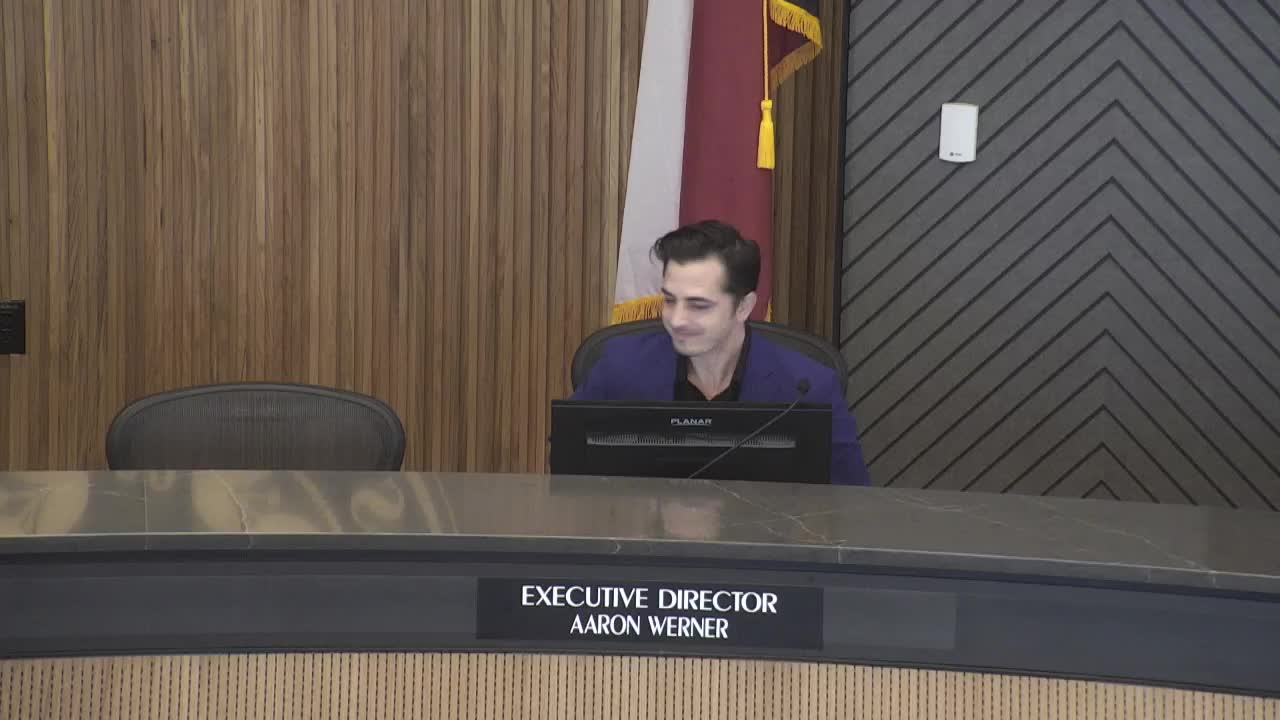Visit McKinney board approves hotel-occupancy-tax grant rules requiring 25 room-night minimum
Get AI-powered insights, summaries, and transcripts
Subscribe
Summary
The Visit McKinney board voted Feb. 25 to change its festival and event hotel-occupancy-tax (HOT) grant program to a room-night-based model, setting a 25 room-night minimum, a $5,000 maximum grant, rolling applications and verification by hotel pickup reports.
The Visit McKinney board on Tuesday, Feb. 25, 2025, approved changes to its festival and event hotel-occupancy-tax (HOT) grant policy that will tie awards to verified overnight stays and set a 25 room-night minimum to qualify.
The board approved the policy update during its meeting at City Hall and Council Chambers, 401 E. Virginia St., McKinney. Aaron Warner, executive director of Visit McKinney, told the board the revisions are intended to align the program with state HOT rules and to better target funding toward events that generate hotel stays.
"Every expenditure must directly enhance and promote tourism in the hotel and convention industry," Warner said, summarizing the state standard the board used in its review. He said the board will now evaluate and pay grants based on verified room nights rather than on marketing-reimbursement receipts.
The changes include a minimum of 25 room nights generated by an event to qualify for funding, a rolling application process (no fixed cycles), an application deadline tied to the event (applications must be submitted within 90 days of the event), committee review using a rubric, and final payment based on verified hotel pickup reports. Warner said the grant program will retain a $5,000 maximum award. The policy also discourages repeated annual funding after five consecutive years unless an applicant demonstrates year-over-year room-night growth.
Board discussion cited historical program data: since 2021 the Visit McKinney grant program distributed $81,750 and, according to staff figures cited at the meeting, those applications accounted for 72 room nights overall. Staff and the grant committee said much of the prior funding did not produce overnight stays and that the new rules are intended to close that gap.
Whitney Nash, vice chair of the board and member of the grant committee, summarized the committee's work: the committee met multiple times with staff, reviewed statewide benchmarks and recommended trimming the commonly used 50-room-night statewide threshold down to 25 room nights for McKinney as a proportionate standard. Nash said the committee also aimed to streamline applicants' paperwork by moving from a marketing-reimbursement model to room-night verification via hotel reports.
Board members asked how unused funds would be handled and whether funding could be split across hotels. Warner replied that unawarded HOT funds would remain in the Visit McKinney budget and would not automatically roll over, and that the 25 room-night minimum can be met across multiple hotels in the city.
After brief additional discussion, board member Ephraim Wyndham moved to adopt the grant-policy updates; Patrick McGuire seconded. Chair Katie Scott called for the vote and the motion passed.
Votes at a glance
- Consent: Approval of Visit McKinney minutes from Jan. 28, 2025 (agenda item 25-2471). Motion by Patrick McGuire; second by Brian Medina. Chair Katie Scott called the vote; motion passed.
- Main action: Adopt festival and event hotel-occupancy-tax grant policy and procedure updates (agenda item 25-2474). Motion by Ephraim Wyndham; second by Patrick McGuire. Motion passed.
What changed and why it matters
Under the new policy, Visit McKinney will prioritize HOT grants for events that demonstrably bring overnight visitors to McKinney, which can increase hotel revenues and taxable spending in the city. Staff said the changes are designed to comply with state requirements for how local hotel-occupancy-tax revenues may be spent and to concentrate limited HOT dollars on events likely to generate stays.
Implementation details noted at the meeting include: staff review of applications, grant-committee rubric scoring, verification of room nights via hotel pickup reports for final payment, a $5,000 maximum award, rolling intake rather than fixed cycles, an application-to-event timing requirement (apply within 90 days of event), and a five-year consecutive funding limit with exceptions only if the applicant documents growth in room nights.
Board members and staff said Visit McKinney plans to publish the revised policy immediately if approved and release a public notice and application form on its website so incoming events can apply under the new rules.
The meeting also included a range of standard board reports and announcements but no other formal policy actions related to HOT grants.
